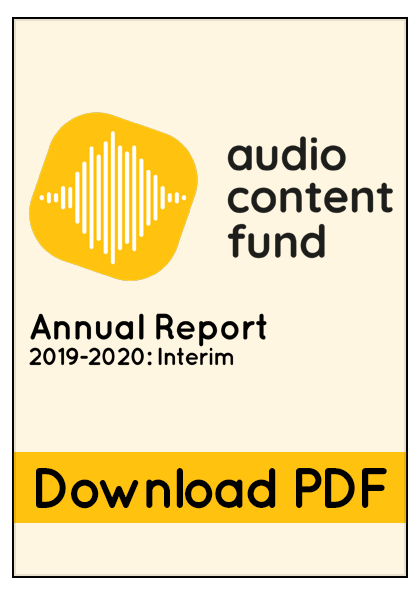Read our Annual Report: details of 2019 grants
- Full details of how 2019 budget was spent on 25 public service radio projects
- 21 suppliers, 35 radio stations, 162 hours of content, 5.6m listeners
- 60% of suppliers based outside of London, with broadcasts in all four nations
The Audio Content Fund has today released its first Annual Report, which provides a detailed breakdown of the £655,898 it distributed to 25 public service radio projects in 2019.
The report outlines how the fund, which is financed by the UK Government, supported 21 different UK independent production companies, to produce 162 hours of content, for broadcast on 35 different commercial and community radio stations.
An audience of 5.6m listeners is expected to hear the content, which covers factual, drama, comedy, live discussion, children’s, sport and current affairs material.
ACF funding has created unique opportunities for indies to work with commercial and community radio, with 23 out of the year’s 25 projects representing new business relationships between suppliers and broadcasters.
Fifteen of the funded projects were produced outside of London, with content created for broadcast in all four nations of the UK, and several funded projects primarily focused on BAME, LGBT, or disabled narratives and perspectives.
The Annual Report goes on to summarise the ACF’s recent funding round to support audiences during coronavirus, in which it distributed a further £400k to 28 projects that will fill gaps in listeners’ lifestyles and livelihoods caused by lockdown restrictions. This activity will be fully detailed in the fund’s 2020 report.
Reflecting on the Audio Content Fund’s first year, Helen Boaden described chairing its Independent Funding Panel as “a pleasure and a privilege” and went on to say: “We’ve been delighted by the sharp ideas, across every genre, developed by Indies for the tightly disciplined schedules of commercial radio, and the focused remit of specialist and community stations.”
Managing Director of the Audio Content Fund, Sam Bailey, said: “Seeing such creative and impactful ideas take shape on commercial and community stations has been a joy, and I’m extremely proud of the huge appetite I’ve seen for radio to be a force for good in what feels like an increasingly challenging world.”
John Whittingdale OBE MP, Minister of State for Media and Data, said: “We set up the Audio Content Fund to bring to life brilliant ideas for high-quality and home-grown radio shows which add to the richness of the UK’s media landscape. Since the first funding awards were made a year ago, millions of people have enjoyed over 150 hours of documentaries, comedy, drama, and shows that otherwise wouldn’t have been made. Crucially, it has helped bring more diverse voices to the airwaves and has also reflected communities’ experiences of coronavirus. I hope the initiative continues to go from strength to strength and continues to help independent producers create even more vital programmes for commercial and community stations.”
Will Jackson, Managing Director of AudioUK, and a Director of the Audio Content Fund, said: “I’m delighted that the Audio Content Fund has got off to such a great start, creating new and diverse partnerships between audio-led production companies and commercial and community radio across the UK. I’m also pleased we were able to use the Fund to respond so quickly to the challenges of coronavirus, enabling listeners to continue to benefit from high-quality public service content on their favourite stations. We’re grateful for the continued support of DCMS and look forward to hearing further creative programming from innovative new partnerships in the coming rounds.”
Siobhan Kenny,
CEO of Radiocentre, and a Director of the Audio Content Fund, said:
“When the Government agreed to include
radio as part of its contestable fund pilot scheme, it was setting a challenge
to our industry – to use this opportunity to develop new ways of producing
high-quality, original and distinctive radio output. The brilliant programming that has been
supported by the Audio Content Fund so far provides compelling evidence of how
radio stations and producers are meeting this challenge and that contestable
funding can really work.”







